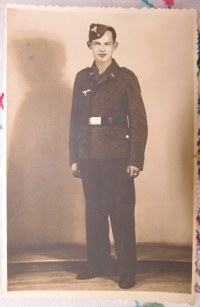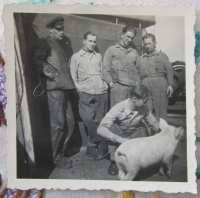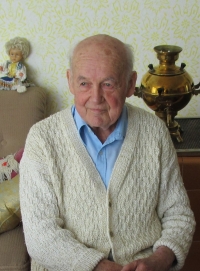In February 1942, he was ordered to join the air force in Vienna
Download image
Jan Dražan was born on May 9, 1922 in Nová Bystřice as the youngest of eight children. His father was a stonemason, his mother a housewife. In Nová Bystřice the Czechs were in the minority, so as a primary school pupil Jan got to know the Czech-German environment, which became radicalized after the rise of Hitler with the growing Sudeten German Party. He experienced first-hand the mobilisation in 1938, the arrival of Czechoslovak soldiers at the border fortifications and then the occupation of the Sudetenland by the Wehrmacht and its annexation to Germany. As the family remained in Nová Bystřice, they automatically became Reich nationals, so in January 1941 Dražan received a call to the German labour service. In Korutany, he underwent training under the motto “spade instead of gun” and was then transported with others to Poland, where he prepared ammunition and food supplies for the planned attack on the Soviet Union. He served in Poland on labour duty until his discharge in December 1941. He returned to his parents, but in February 1942 he was ordered to join the air force in Vienna. After completing his training he was sent to Brno among radio specialists (he also worked with the Enigma cipher machine). From there he headed to Erfurt airport. In 1942, Jan Dražan was assigned to an air field division, with which he found himself in Amsterdam, the Netherlands, where he served as a radio operator. He spent several months in Amsterdam in hospital with a badly broken leg, which was run over by a car during an alarm. After returning from hospital he was transferred to Poland, to Babí důl airfield near Gdynia. At that time he held the rank of corporal, which he retained until the end of the war. After the surrender of Germany, he remained in captivity for six months. He was released in Pacov at the beginning of October 1945. He returned to Nová Bystřice, where he started working in the Partex company. In the former Sudetenland, Dražan witnessed the expulsion of Germans, the settlement of the borderlands by so-called gold-diggers and, after February 1948, illegal crossings across the border into Austria. In 1948 he married and a year later had to re-enlist, this time in the ranks of the Czechoslovak People’s Army. He had problems with the communist authorities only because of his religious beliefs. After returning from the war he was offered a job as a foreman, but the condition was to join the Communist Party, which he refused. He eventually worked at Partex until his retirement. After 1989, Jan Dražan became a member of the KDU-ČSL and chairman of the party organisation in Nová Bystřice. Jan Dražan died on June 7, 2014.




